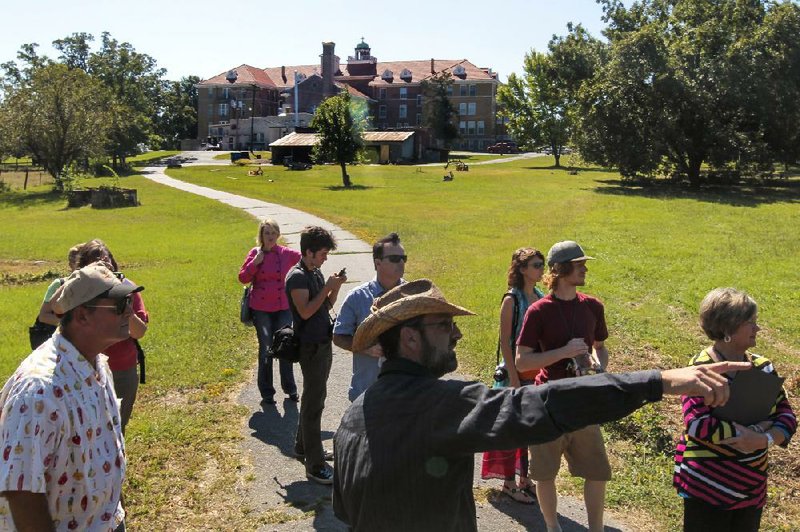A historic orphanage in North Little Rock that has been largely vacant for more than a decade is returning to the roots of its mission through a transformation into an organic farm to serve nearby communities.
St. Joseph Center of Arkansas Inc. - a nonprofit organization formed in 2010 to preserve the century-old building - acquired the 63-acre property in North Little Rock near the Camp Pike portion of Camp Robinson Road and signed a50-year lease. Since the sale, the group has been sifting through proposals to develop the property.
Jody Hardin - a farmer who founded the Argenta farmers market and other projects - proposed the idea of turning the property into an organic farm complete with cattle, goats, chickens, hogs, a food forest and community plots. It’s a long-term goal that’s already begun with preservation of the acreage’s soil.
“I heard so many people say there’s this beautiful property in North Little Rock that’s just waiting for the right plan. I heard this for about five years,” he said as he formally revealed his five year plan for the facility at a Tuesday morning news conference inside the four-story building. “And it’s very important that we pull together a lot of partnerships to make this work.”
Under the plan, the St. Joseph Farm - the property’s new name - will operate with a farm-to-table methodology, where every step in the process is intended to benefit the surrounding communities.
Classes, field trips and seasonal events will help educate people on growing, preparing and cooking healthful meals. Another program will teach rural residents how to farm their land and feed their families and community. And 10 public plots at the farm will be used for a community-outreach program that Hardin envisions will grow.
Half of the produce grown at the farm will be donated to families in need, and the other half will be sold to fund the operation.
“This is the most amazing mission I’ve ever been a part of,” Hardin said. “It is a creative, living example of a diversified [and] sustainable agriculture enterprise that does education, community outreach and feeds the hungry. This is truly a nonprofit endeavor of mine.
“I’ve been farming for profit for years - trying to farm for profit. I finally just gave up and said, ‘Hey, let’s just feed the ones who need it. Let’s give the food to the communities who need us most. Let’s create new farmers, and let’s create systematic change in our rural communities where the local food systems have broken down.”
St. Joseph’s Orphanage operated from 1910 to 1978, when it became a day care that lasted until 1997. Until St. Joseph Center of Arkansas Inc. acquired the facility, it was owned by the Diocese of Little Rock and used for Catholic groups’ retreats.
The building, constructed in 1910, is in good condition, and most of the antique equipment still works, including a walk-in freezer, bread oven and other kitchen tools.
As Hardin led a small group into the cellar, he called it “the cheese cave” - a pantry area he plans to use for making and aging cheese after obtaining permits to house goats on the premises.
In addition to food such as vegetables, cheese and eggs, the farm will produce a special type of manure to sell. Twenty-four cattle already live on the property.
Hardin is most excited about plans for a 20-acre food forest, which would be the only one of its kind in the state and one of the largest in the nation.
The plans call for seven different crops planted on an incline, with small reservoirs below each section to collect rainwater. Trails will be created from one section to another, allowing visitors to “snack their way through,” Hardin said.
“It’s going to take a long time to mature, but we are going to start right now,” he said, adding that rocks have to be moved and soil has to be treated.
“It’ll be a place people will come to experience nature, but also a learning experience on how the different fruits and vegetables look and grow.”
The idea of teaching people to farm in their communities developed in part from Heifer International’s new Seeds of Change program, in which the organization’s U.S. programs director, Perry Jones, and staff members help beginning farmers get access to land and teach them how to farm, which creates jobs and food.
Jones has been a mentor to Hardin. Although some groups have already partnered with St. Joseph Farm, more partnerships will be needed to continue the operation long term, said Sandy DeCoursey, president of St. Joseph Center of Arkansas Inc.
One way the group will fund the operation is leasing out studios to artists on the fourth floor of the 80-room building. Some artists are already showcasing their work there.
“This will all help to accomplish our goal of not only bringing this place back to life, but having a source of funding that will not only provide outreach and wonderful mission-compatible nonprofit groups’ missions, but also to help renovate the building and get it back up to speed so it can be enjoyed once again,” DeCoursey said.
Arkansas, Pages 9 on 09/25/2013
